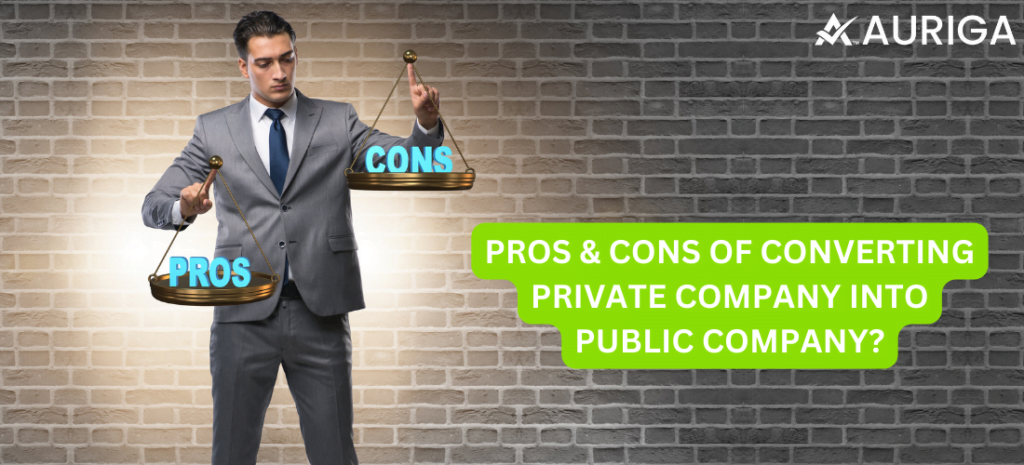PRONS & CONS OF CONVERTING PRIVATE COMPANY INTO PUBLIC COMPANY?
Introduction
Toggle
PRONS & CONS OF CONVERTING PRIVATE COMPANY INTO PUBLIC COMPANY?
INTRODUCTION
Going public is a major decision for any company. It can bring significant benefits, such as increased access to capital, enhanced brand awareness, and the ability to attract and retain top talent. However, it also comes with some risks, such as loss of control, increased regulatory compliance, and increased scrutiny.
In this article, we will discuss the pros and cons of converting a private company into a public company in more detail. We will also provide some tips for companies that are considering going public.
Here are the pros and cons of converting a private company into a public company
Pros of converting a private company into a public company:
- Increased access to capital: When a company goes public, it can raise capital by selling shares to the public. This can provide the company with a significant amount of money that can be used to fund growth, acquisitions, or other strategic initiatives.
- Increased liquidity: Once a company’s shares are listed on a public stock exchange, they can be bought and sold by investors. This gives shareholders the ability to easily exit their investment, which can increase the company’s overall liquidity.
- Enhanced brand awareness and credibility: Going public can help to increase a company’s brand awareness and credibility. This is because being listed on a public stock exchange is seen as a sign of success and maturity.
- Increased ability to attract and retain talent: Public companies are often able to attract and retain top talent because they offer the opportunity to own shares in the company. This can be a major advantage in industries where there is a shortage of skilled workers.
- Enhanced corporate governance: Public companies are subject to a more rigorous set of corporate governance rules than private companies. This can help to ensure that the company is managed in a transparent and accountable manner.
Cons of converting a private company into a public company:
- Loss of control: When a company goes public, it gives up some control over its operations to its shareholders. This is because shareholders have the right to vote on important corporate decisions, such as the election of directors and the approval of major transactions.
- Increased regulatory compliance: Public companies are subject to a more rigorous set of regulations than private companies. This can increase the company’s legal costs and make it more difficult to operate.
- Increased scrutiny: Public companies are subject to increased scrutiny from the media, regulators, and investors. This can make it more difficult to keep confidential information private.
- Dilution of ownership: When a company goes public, it issues new shares to the public. This can dilute the ownership of existing shareholders.
- Short-term pressure: Public companies are often under pressure to deliver short-term results to satisfy their shareholders. This can lead to the company making decisions that are not in its long-term best interests.
Additional considerations:
In addition to the pros and cons listed above, there are a few other factors that companies should consider before converting to a public company. These include:
- The company’s size and growth potential: Companies that are larger and have the potential for significant growth may be more attractive to investors.
- The company’s industry: Some industries, such as technology and healthcare, are more conducive to public ownership than others.
- The company’s management team: A strong management team with a proven track record is essential for a successful public company.
- The company’s financial condition: Companies with strong financials and a clear path to profitability are more likely to be successful as public companies.
Conclusion:
Whether or not to convert a private company into a public company is a complex decision that should be made on a case-by-case basis. There are both potential benefits and risks associated with going public, and the decision should be made after carefully considering the specific circumstances of the company.



